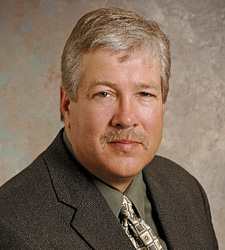Chairperson, Department of Biological Sciences
Professor, Biological Sciences
Email: rlduncan@udel.edu
Phone: 302-831-4296
Fax: 302-831-2281
Website: http://www.bio.udel.edu/users/rduncan
SciNav Link: http://scinav.udel.edu/individual.php?lastname=%27Duncan%27&firstname=%27Randall%27
B.S. - Southwestern College
Ph.D. - Oklahoma State University
Postdoctoral - Medical College of Virginia

The development of skeletal architecture and the maintenance of bone mass is dependent on the mechanical stresses and strains encountered throughout our lifetime. Removal of these physical forces during paralysis, microgravity encountered in spaceflight, and even extended bed rest, results in a rapid loss of bone with up to 2% of total body calcium lost per month. Conversely, increased activity and exercise has been shown to reduce the rate of bone loss in osteoporotic patients and application of exogenous mechanical loads can result in increased bone formation in a modeling skeleton. The focus of the research in my lab is to understand how mechanical signals are perceived by bone cells and converted into biochemical responses within the cell to promote bone formation.
One of the earliest responses of the osteoblast, or bone-forming cell, to a mechanical stimulus is an increase in intracellular calcium that occurs within seconds of stimulation. The primary focus of the research in my lab is to define the role of ion channels in this mechanically-induced increase in intracellular calcium and how the changes in channel activity influence the function of the cell. We also seek to determine how the cell can control the kinetics of these channels. Finally, we are using genetic manipulation to determine how mutation, overexpression and knockout of various components of the proposed mechanotransduction pathway alter the response of the skeleton to mechanical loading.